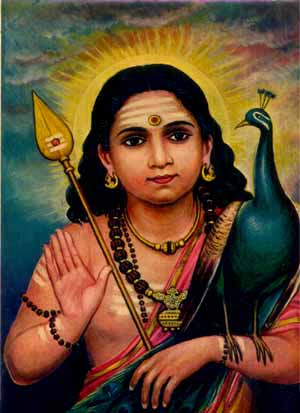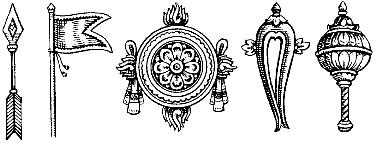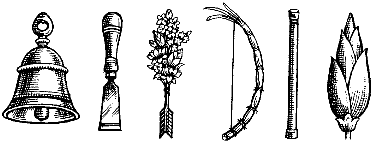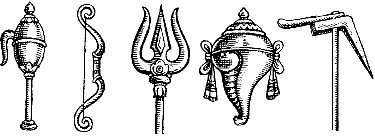
|
||||||
|
| ||||||
Lord Murukan, the embodiment of beauty and love
Padmaja Anantharaman"Beauty is truth, beauty is love.
This verse by John Keats with a slight variation is quite suitable to the worship of Lord Murukan, the embodiment of beauty and love. Man worships God to improve himself in different aspects of life. The worship of the Lord in varied forms, names and ways is an ancient cult that has become widely popular slowly and steadily. Hence arises the noble curiosity to ponder over the divine figure of Lord Murukan, His dwelling places and celebrated puranic tales associated with him. The experiences of Murukan devotees enhance His glory and power. Now the aim is to trace the concepts connected with the cult of Murukan as an embodiment of beauty and love. His holy figure and divine activities are good illustration. In brief, Murukan means beauty and also Murukan means love. Muruku is an ancient Tamil term. In course of time with the masculine gender suffix, -an it became Murukan. In fact Lord Murukan is the ancient god of Tamilians. They considered him to be the god of mountains. He is fond of dwelling in places encircled by beautiful natural scenery. Hence He is seated among hills blooming with blossoms. In olden days the region of the Tamilians was divided into four kinds of lands. They are Kuriñji, Mullai, Marutam and Neytal. A different deity was worshipped in all the four places. The presiding deity of hill and hillsides known as Kuriñci was Lord Murukan; that of forest and its surroundings called Mullai was Tirumalai. Indra was the chief deity of Marutam covering paddy field and its neighbourhood; Varuna was for Neytal, the desert area. Of all the places the loveliest place was the mountain area. Naturally in keeping with its enhancing sylvan surroundings Lord Murukan, the embodiment of beauty was worshipped there. Hence He is addressed as the owner of Kuruñji by the Tamil poet Nakkirar in Tirumurukārrupatai. Different ConnotationsThe term muruku has several connotations such as fragrance, youth godliness and beauty. The ancient Tamils referred to God with the term Murukan. Naturally He has natural fragrance, changeless youth, immortal beauty and divinity in all things where there is beauty the other three qualities also dwell there. In toto all these qualities are seen in love. Hence arises the curiosity to find out the varied modes adopted by different poets. Being enchanted by the beauty of the Lord they love Him seriously and sincerely. Their love finds an outlet in the form of poetical expression. For instance Nakkirar has sung in praise of his beauty in general in his literary work Tirumurukārrupatai. According to him what is made by hand is artificial and what is not done by man or manus is natural. The world is fond of talking about beauty but it is rather difficult to explain it for it is an abstract term. Beauty can be realised and felt through varied facets of Nature. It is better to see the connection between beauty and Nature for they are closely allied. In truth the body of beauty is nature for it is mingled everywhere in it. The blossom of beauty is Nature. The logical conclusion is beauty is Nature and Nature is beauty. Beauty is revealed everywhere both outwardly and inwardly. In other words the aesthetic sense is revealed by external as well as internal aspects. Just as the blossom exudes its fragrance beauty spreads out its brightness. The whole universe is filled with beauty in several ways. It is the warp and woof in the mingled web of human life. All these blended together is the monument of beauty. This is the endless and perennial beauty of Murukan which inspires the fire of love in the hearts of the beholder. Lord Murukan always looks young and never attains senility. The worshippers of Lord Kumara by words and deeds become Kumara attaining youthhood answering the name. Murukan's NamesLord Murukan has enchanted people by his names too. He has several names to his credit. Poet Arunagirinathar praised Lord Murukan several times in several ways. Being the dweller of hillocks Lord Murukan is called Kumara Vadivelan dancing on each hill. When he was brought up by six Krttikā lasses, He was in the form of six children. As Uma Devi embraced the six, they blended into one with six faces and twelve hands. He is called Gangeya for being nurtured in river Ganges; Saravanan was one of His names as He was born in the pond of Saravanai; also known as Katampan for sleeping under the shade of katampa trees. Six faces gave Him the name Ārumukam and His youth and beauty gave the appellation Alakan. He is called Guha for He is enthroned in the hearts of his devotees. As He was born on the star Visakam, He is also called Visakan. He was honoured with the titles 'Lord Father', chieftain Lord, Swāmināthan for teaching the meaning of the divine Pranava mantra "Om" to His father Lord Siva. These different meaningful and significant names of Lord Murukan have enhanced His popularity. They make a deep mark on the hearts of people. Consequently numerous songs are composed in honour of His meritorious names.
AccessibilityMurukan is simple and humble and so easily accessible to His devotees. It is not enough if one repeats the name of Murukan often. But what is needed by the Lord is a pious and truthful heart brimming with love. He hastens to them to protect them from danger. As Kacciappa Civaccariyar says that ultimate purpose of Lord Murukan's birth, in other words an avatar is the salvation of the world and its inhabitants. Mere mechanical chanting of His name is not preferred by Him; He can be approached easily through the ladder of love. It should be pure unalloyed love for the Lord alone. The grace of Lord Murukan can be acquired in an easy manner by means of pure devotion and dedication. Certain qualities are known to be the hallmarks of the devotees of Murukan. The primary thing is to be rid of pride and haughtiness. The blessings of the Lord induces intelligence from which arises wisdom. This power of wisdom is manifest in the spear (Vel) held by the Lord. A close study of Arunagirinathar's Tiruppukal reveals many a truth. The poet has accused not women but lust which arises from them. Certainly women with sterling good qualities emanate beauty all around them. The immense faith and love of the devotees for Lord Murukan will help them attain what they like, love Him intensely for faith can deify a man. The dominating quality in a true and honest baktha is His limitless love for the Lord. It alone induces as well as inspired him to worship Murukan. Bards on MurukanPoet Subramania Bharati has sung in praise of Lord Murukan in his Velan Pattu: "Murukan Murukan Murukan
Bharati's Murukan has twelve hands, two majestic eyes and a successful spear. Kavimani Desika Vinayagam Pillai sings: "I don't want to be born as a king
Namakkal the Gandhiyan has sung in praise of the glory of the Lord. His made love for Murukan makes him exclaim: I saw Him coming on a peacock
Whereas Uluntuptai Shanmugam frankly admits that the only God known to him is Lord Murukan. Even the mountain like great misery can be wiped away like a dew-drop by the mercy of Murukan. Similarly several bars have given expression to their deep passion for Lord Murukan. Murukan and rednessOf all the colours, red has the most power to impress people. That makes the skilful Tamilian wear red kumkum on the forehead. Similarly Lord Murukan is known to be the representation of vermilion shade in several ways. As a result, the devotees and disciples of Murukan are always on the ascending order. Murukan is red in complexion having ruddy feet; His divine complexion is as red as coral; He is adorned with red garment. Indeed He is the protector of the world making people live in happiness and safety He proved Himself the saviour by cutting asunder the Krauñca Hill with His spear and got rid of the giant of ignorance. Thus a beautiful pen picture of the Lord is given in Kuruntokai. Already the Lord is "beauty sitting in a monument". His red face, merciful eyes, glittering forehead, sharp nose and mischievous smile creeping on his lovely lips as the child-god Bāla Kumaran is really an impression of beauty par excellence. Naturally love dawns in the minds of the spectator. Consequently beauty provokes love. Hence the worship of Murukan is a fine blending of aesthetic love. Significance of spearWhatever the size and shape of Lord Murukan may be, He is never seen without his weapon the spear called "Vel". The Tamil connotation of the term Vel depicts its function of generally acquiring victory. The lengthening of the verb vel becomes Vēl. Vēl is a generic term. It serves in the hands of Yama, the Lord of Death as sūlam to defeat enemies. Even Lord Civa has Vēl in His Hand besides His other weapons like parasu, man and malu, but they are never used. Lord Civa, the embodiment of wisdom welcomes His son as "Kumārāya" Ku stands for ignorance and Maraya for the killer or destroy, Namaha means worship him. In brief, "I worship the one who does away with ignorance. Why should the father worship the son? When the babe is ill the mother takes the medicine. Similarly Lord Civa keeps himself a model so that the living beings of the world can worship the feet of Murukan to attain salvation bu getting rid of ignorance. Hence the spear in the hands of Murukan is of greater significance than that of Civa. Celebrating the Vel it has been honoured as the "reputed Vel". The Jain epic "Cintāmani" (Mukti Ilampakam) addresses Murukan as the celebrated holder of Vel. Seeing victory estabilished by the Vēl of Murukan, his Vel alone is considered to be the best of the three held by Civa, Murukan and Yama. Vēl means wisdom, hence what is wisdom in Sanskrit is Vēl in Tamil. The term "power" (Skt: shakti) means having the quality of defeating and also the quality of providing joy for the possessor. The overt meaning is not obvious but it indicates the power of wisdom. In the eleventh Nikandu Mandala Surudotamar says, Ayiylenba Vēlē." So wisdom has become Vēl, which has a special significance. It will not destroy the body like armies. But blending with life it will ruin the hostility of ignorance, which can enchant life. Hence the surname "special" - surrender thevselves to Murukan with speedy special Vēl. In brief that which can conquer is Vēl in other words the embodiment of wisdom. It helps to remove enemity, hunger, fear of life and death. To possess it will enrich one with happiness and prosperity. So people attach the appellation in Vēl as suffix to their names such as Katirvel, Kanakavel, Muttuvel, etc. Two BirdsRegarding peacock, the mount of Murukan, it is a symbol of joy in its dance when fertile rains fall. Suppressing the pride of peacock Murukan made it his vehicle. Snake overpowered in the claws of peacock is the symbol of Time, i.e. death. The second bird originating from the destroyed Cūr is rooster, the herald of the dawn. It is the symbol of generation and of procreation. Being the dispeller of darkness the bird is raised to His banner. The worship of Lord Murukan takes place with great pomp and show. People found immense delight in worshipping Him. As an outlet of their happiness they used several rural musical instruments in their cult of worship such as the singing of flute, the tuning of the like and the beating of drum so say Kadialur Uruttirrakannanar in his Pattina-p-palai. Thus the ancient Tamilians celebrated the festivals of Lord Murukan having deep faith mingled with love and culture fasting is observed on every Monday. The deep involvement in the worship of Murukan even today attracts one and all. In tune with modern trends, devotees of Murukan have adopted new rituals and rites. In olden days people were satisfied in simply visiting the shrines of Murukan to offer their prayers. But at present there is a striking difference even in the cult of Murukan worship. People undertake penance for a certain period of 45 days with severe restrictions in food habits and living. Naturally this will be a chance to purify themselves physically, mentally and spiritually. As a result their thoughts, words and deeds are good and sincere. They take bath twice a day and perform pujas without fail reciting the name of Lord Murukan always. They abstain from eating oninon, meat, garlic, and such other items which will agitate their nervous system. Such a kind of sattvic food has a great impact on their nature, temperament and activity. They avoid visiting the house of condolence or other had places. They wear clean and ordinary clothes with garlands of sacred beads and adorn their foreheads with holy ash. They prefer wearing green dhotis. In fact, their needs have become limited for their chief interest in focused on reciting holy songs about the Lord. After hard penace they make their way to the shrine of the Lord barefooted covering the often great distance on foot. Their piety inculcates them with firm will power. Their simple living and high thinking makes them a model for the people around them. Carrying kavadi is another common phenomenon in the worship of Murukan. Some of them carry it all the way from their home to the distant Murukan temple. The kavadis are of varied types such as milk, honey, fruit, rice rose water and such other things. Some of them carry Vēl (spear) in their hand and some insert it through their cheeks as an offer of prayer. These rituals are commonly undertaken in the way of answering their prayers and vows taken for curing their uncurable illnesses and other (successes) victories. Besides, a number of similar rituals observed in other temple are also imitated by the devotees of Murukan. The pride of Murukan is His Vel, which is the embodiment of wisdom. To worship Vel (spear), the holy weapon of the Lord is their work. Myths associated with the worship of Lord Murukan give an indication of life on earth and even the development and growth of it. Still they find a prominent place to solve the problems of human beings in the emotional life of community in varied phases.
Index of research articles on Skanda-Murukan |




